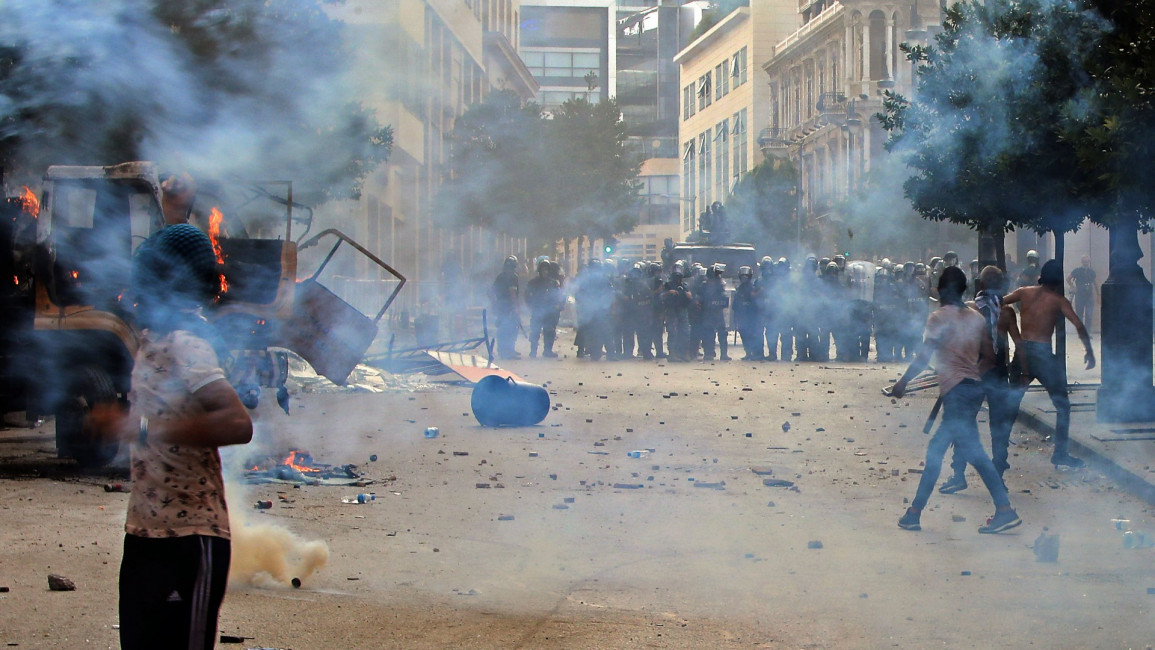Lebanese security forces fire tear gas at Beirut protesters on 'Saturday of revenge'
Thousands of people had poured into Beirut's main square on "Saturday of revenge", hanging up symbolic nooses that they say officials should be hanged on over this week's blast, while protesters and riot police clashed near parliament.
The violence by a small group of young men began at the start of anti-government protests planned in the wake of the deadly explosion at Beirut port that devastated large parts of the capital and killed more than 150 people.
The health ministry said on Saturday that over 6,000 people have been injured, while hundreds of thousands have been made homeless.
Saturday's protest was the first significant demonstration since the explosion and organisers planned to hold a symbolic funeral for the dead.
As the protest got underway however, small groups of young men began throwing stones and rubble at security forces.
Twitter Post
|
Near parliament, riot police fired tear gas at protesters who hurled stones and tried to jump over barriers that close the road leading to the legislature. The protesters later set on fire a truck that was fortifying barriers on a road leading to parliament.
The gathering at Martyrs Square and outside the parliament building and government headquarters came amid popular anger against Lebanon’s political leadership. The country’s ruling class, made up mostly of former civil war-era leaders, is blamed for widespread corruption, incompetence and mismanagement that contributed to Tuesday’s explosion.
The army issued a statement reminding the protesters to act peacefully and abstain from closing roads or attacking public or private property. Police also issued a statement after the protests began urging people to act “in a civilised way far away from violence."
The protest came as senior officials from the Middle East and Europe arrived in Lebanon in a show of solidarity with the tiny country that is still in shock suffered after Tuesday’s blast.
The explosion of thousands of tons of ammonium nitrate stored at the port, apparently set off by a fire, was the biggest in Lebanon's history and caused an estimated $10-15 billion worth of damage, according to Beirut's governor.
Lebanon is mired in its worst economic and financial crisis in decades, making it difficult for many people who had their properties damaged to fix them.
Documents that surfaced after the blast showed that for years officials had been repeatedly warned that the presence of 2,750 tons of ammonium nitrate at the port posed a grave danger, but no one acted to remove it.
Read also: Over 40 Syrians killed in Beirut blast: embassy
Officials have been blaming one another since the explosion and 19 people have been detained including the port’s chief, head of Lebanon’s customs department and his predecessor.
The ammonium nitrate, a chemical used in fertilisers and explosives, originated from a cargo ship called MV Rhosus that had been traveling from the country of Georgia to Mozambique in 2013.
It made an unscheduled detour to Beirut as the Russian shipowner was struggling with debts and hoped to earn some extra cash in Lebanon. Unable to pay port fees and reportedly leaking, the ship was impounded.
In 2014, the material was moved from the ship and placed in a warehouse at the port where it stayed until the explosion.
Agencies contributed to this report.
Follow us on Facebook, Twitter and Instagram to stay connected



